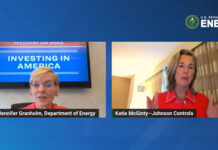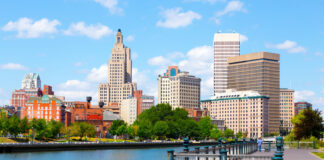 After more than two decades of dithering and word-parsing, the United Nations’ international panel of climate change experts finally cleared its throat a couple of weeks ago and gave us the bad news.
After more than two decades of dithering and word-parsing, the United Nations’ international panel of climate change experts finally cleared its throat a couple of weeks ago and gave us the bad news.
Climate change is upon us, the UN experts say, and if we don’t act NOW the human race will face a global catastrophe that will make the biblical plagues seem like a kid’s theme park. Floods, wildfires, mega-storms, agriculture gone fallow, famines, wars over drinking water, two billion coastal dwellers displaced by a 20-foot rise in the oceans, all of it coming soon to a planet near us–the one under our feet.
The UN panel dressed up its apocalyptic warning with a call to action, suggesting that if we somehow manage to get our act together on drastically cutting carbon emissions in the next 10 years we can mitigate or at least delay by a few decades the worst of what comes next. This at a time when the amount of carbon dioxide in the atmosphere has been estimated at 400 parts per million, long specified as the tipping point for self-sustaining climate change.
This week, the U.S. government weighed in, releasing a report from scientists revealing that the effects of manmade climate change already are being felt throughout the United States. These include diminishing water resources, drought and wildfires in some regions, torrential rains, floods and mega-storms in others. Triple-digit heat waves just about everywhere, including parts of northern Minnesota where they can now forget about ice-fishing from October through April (maybe a couple of weeks in January).
As dire as these projections are, they’re actually sugar-coated.
Remember when the CIA told our leaders in the late 1980s that the Soviet Union was stronger than ever? Remember when economists predicted China’s GDP would not overtake the United States as the world’s No. 1 economy until 2020? Well, the Soviet Union disappeared in 1990 and China is leapfrogging the U.S. as you’re reading this.
The warning that average global temperatures may increase by 10 degrees by the end of this century is off by about 60 years–and the scientists who issued it know it. They’re giving us the bad news in manageable doses to avoid what the late science-fiction writer Arthur C. Clarke called “cultural shock” (that’s why Keir Dullea morphed into the star child in a Victorian-style room at the end of the worm hole in 2001: A Space Odyssey, but we digress).
If you think carbon dioxide’s a problem, wait until you meet methane.
The permafrost (a.k.a. frozen tundra) that stretches across Russia from the Ural Mountains to Siberia and through the northern half of Canada is loaded with methane trapped in the frozen-solid land mass. There also are millions of tons of methane suspended in ultra-cold bubbles at the bottom of the oceans.
Methane doesn’t linger in the atmosphere quite as long as carbon dioxide, but it can produce a far bigger catastrophe in a much shorter time–methane is approximately 30 times more potent than carbon dioxide as a greenhouse gas. As we reported in this space last year, the permafrost already has begun to melt, producing big, bubbling pools of methane-infused muck in Mother Russia and parts of Canada.
The oceans also will be warming as they rise. At some point, scientists warn, oceanic methane will rise from the bottom and be released into the atmosphere in a gigantic global belch.
Did we mention that methane is routinely vented during fracking operations? The stuff we call natural gas is mainly methane before we burn it. Do you believe the oil-and-gas bidness is taking special care to avoid the release of methane as it feverishly digs thousands of fracking wells and blasts horizontally to unlock 500 trillion cubic feet of natural gas reserves? Yeah, and the Exxon Valdez was just stopping to pick up some smoked salmon.
The hideous warnings we’re currently digesting about the impact of relentless manmade carbon emissions on our atmosphere do not factor in the potential effects of a massive release of methane. When the global methane belch really erupts, global warming will accelerate like a Big Daddy Don Garlits dragster. It says here it will only take about 25 years to get to the Worst-Case Scenario, climate-wise, maybe sooner.
In its next report in five years, the UN’s climate change team finally will reveal the really bad news: climate change has become a self-sustaining phenomenon. All we can do is try to deal with the consequences.
The human race inherited a paradise, a beautiful oasis in the vast emptiness of space, but let’s face it: we’ve become a blight on the planet.
Two hundred years ago, there were less than half a billion of us, living in harmony with the land in agrarian societies. Now, we’re eight billion and counting. Our crops are picked and our cows are milked by machines. We’re paving over everything, burning down rain forests, making fallow our fertile soil, spoiling what’s left of our drinking water, spewing out industrial poisons and expanding our appetite for electricity exponentially. We’re well on our way to wiping out 90 percent of the species that share our little habitat in this corner of the Milky Way.
Spare us the “Save the Earth” keening, tree-huggers. In the immortal words of George Carlin: “The planet’s going to be fine. It’s been here for five billion years. It’s going to shake us off like a bad case of fleas.”
The shaking-off process has begun. The only question is whether the “extinction event” we’ve helped to trigger will include us on the casualty list. Maybe we should clone the dinosaurs and hand them back the crown. They’d thrive in our new swampy climate.
No doubt there’ll be intense discussion in coming years about a moon-landing, Marshall Plan-type effort to engineer a solution to climate change. You’ll hear a lot of talk about putting mirrors in orbit to reflect sunlight or dangling huge hoses from space platforms to vacuum carbon dioxide from the atmosphere. Time for some traffic in outer space.
It ain’t gonna work, and the Mars shuttle won’t be ready in time. If you’ve got any children or grandchildren, you might as well apologize to them now. They’re going to remember us as the feckless generation that messed up their world and didn’t get serious about fixing it until it was too late.
But let’s look at the bright side: in some places, climate change will be a boon to economic development.
All those bars and souvenir stands we rebuilt on the Jersey Shore in the wake of Superstorm Sandy will have to be moved inland soon.
















![[VIDEO] Get More for Your Business in Ardmore. Oklahoma](https://businessfacilities.com/wp-content/uploads/2024/02/maxresdefault-324x160.jpg)
